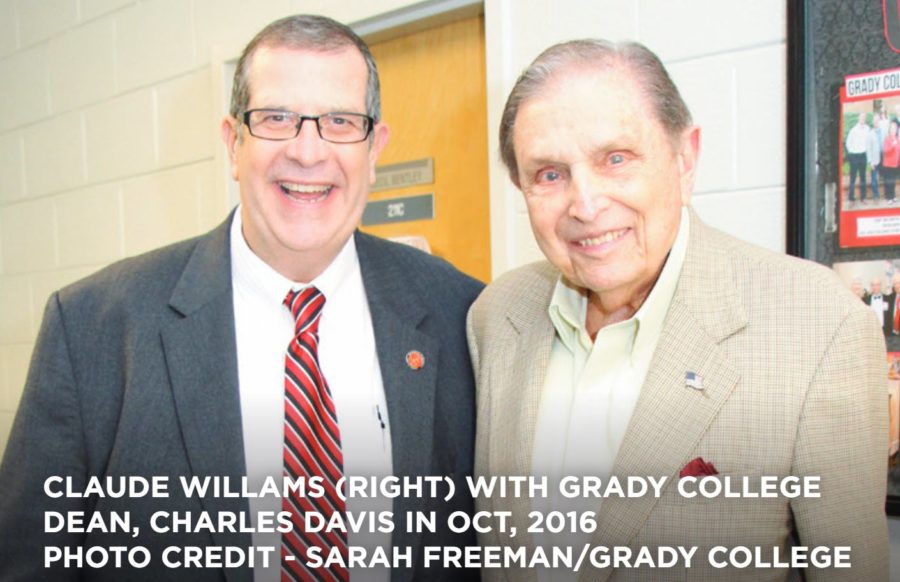Father Time reminds us that time is of the essence, that we should live life to the fullest and remember Satchel Paige’s sage advice–don’t look back, something might be gaining on you.
With the heightened interest in Georgia football following last the Rose Bowl, we all are looking forward to seeing Kirby’s third season get underway Labor Day. The Bulldog nation is experiencing ravenous growth, which brings about a sobering reminder that we lose some passionate followers from one season to the next.
In the last year, Georgia lost one of its illuminating MVPs. Even those who don’t hang out in the sports pages are aware that this acronym stands for “most valuable player,” which is as sagaciously descriptive of the late Claude Williams as suggesting that Frank Sinatra could sing.
Every town ought to have a Claude Williams; a businessman who invests in his community—not just with his resources from which he gladly gave, but emotionally as well, stimulated by pride and thanksgiving.
A native of Tifton, Claude grew up in Gainesville where he graduated from high school in 1940. He then matriculated at North Georgia College and the University of Georgia where he earned an AB degree in history before service in World War II came about.
And that‘s another story, a good one worthy of retelling. Its unvarnished truth reminds you that the Greatest Generation made unending sacrifices to perpetuate the life we enjoy today. Like all the others, Claude was willing to die for his country. Fortunately, he was privileged to come home. He rose to the rank of Captain and earned high honor as a soldier, being awarded the Purple Heart, Bronze and Silver stars, Presidential Unit Citation with two battle stars. He also was honored by France with the “Legion of Honor,” which was created by Napoleon in 1802 to acknowledge services rendered to France “by persons of exceptional merit.”
Grateful for his good fortune, Claude immediately went about distinguishing himself in business. He was innovative and creative. He had canny insights. He had a fertile business mind. Most of all, he seemed to always have propitious timing. He not only learned the art of making the deal, he had a sixth sense for knowing when it was time to move on to something else.
As everyone is aware, the newspaper business has gone through fundamental changes, mostly because of technology. The suspicion here is that the countless people walking about with iPhones stuck in front of their faces—inviting eventful collision—are not searching for any news editorials. Yet it is there if they want it. Columnists are now like broadcasters. Open your mouth and what you say cannot be taken back. Click on your story and you get the same results. Not good for insightful journalism.
My guess is that Claude never gave up on the newspaper industry. He had a telling influence on the local newspapers and felt that Georgia sports were central to success newspapering. A half-century ago, the old Athens Banner-Herald was in survival mode. Claude published a weekly circular, “The Athens Advertiser,” which he gave away. The Athens Advertiser eventually led to the creating of the Athens Daily News, a morning paper. About that time the Morris newspapers of Augusta purchased the Banner-Herald from the Phinizy estate.
Claude could not have hired a more savvy and seasoned editor than Glenn Vaughn, who sought out talented writers like the late Lewis Grizzard. Lewis rose to celebrity status with his newspaper instincts. About that time, a group of investors created the ultra-conservative Atlanta Times to rival with the Atlanta Papers. There was no way the Times had the staying power to compete with the heavyweight AJC.
However, Claude’s sparkling morning paper got the attention of the Athens and University community. As circulation and advertising grew, the Augusta ownership realized that it, like the AJC, it probably had more staying power but that the propitious route was to purchase the competition. There was not room for two competing daily papers in the Athens market.
As a businessman, Claude had made a good decision, but the decision was not without emotion. He wanted to take advantage of the talent in the community and put out an appealing newspaper. The Daily News filled a void.
Claude Williams left his mark on Athens by underscoring sports coverage. He hired savvy writers and columnists, a reminder that there will always be a market for the written word in the Athens-Clarke community. Claude’s journalistic contributions should always be remembered. He was also a good citizen and a good soldier in the literal sense.
He will be lastingly remembered as a “Damn Good Dawg.”

